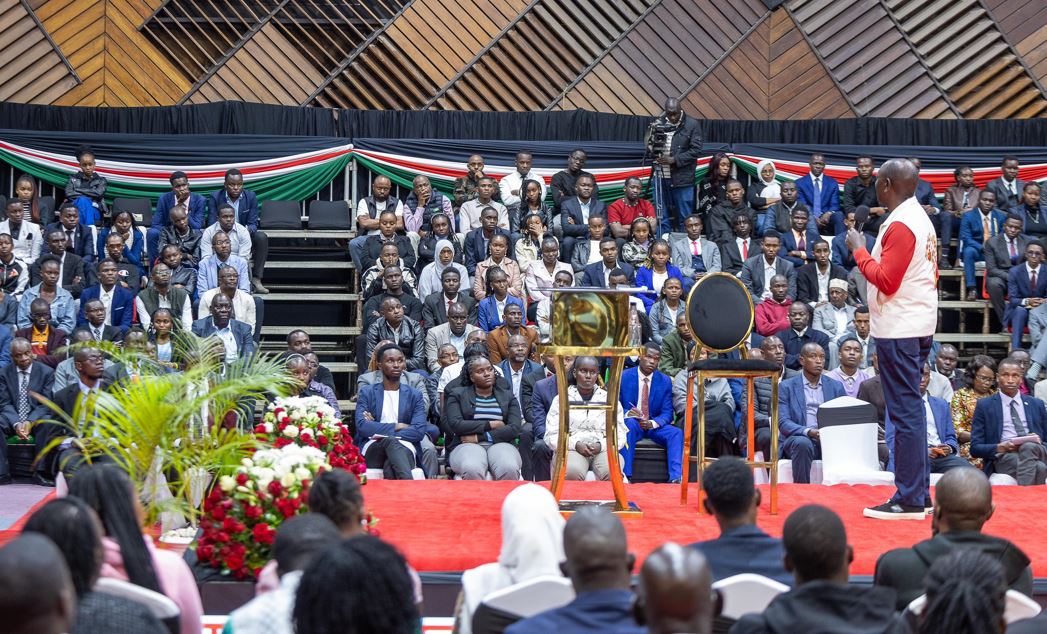University loan applications hit 134,000 as 26,000 students lodge complaints

Ruto said that those who appealed will get their feedback after two weeks after the process has concluded.
All is not lost as President William Ruto says that university students who have been put in the wrong band have a chance to appeal.
Speaking on Sunday, Ruto said that those who appealed will get their feedback after two weeks after the process has concluded.
More To Read
- Kenya’s public schools on the brink amid illegal fees, funding shortfalls
- KUPPET proposes overhaul of funding, abolition of bursaries in fresh push for fully free public education system
- Maraga slams scrapped university funding model as "poorly planned", says government acted without foresight
- Ruto affirms commitment to free, quality primary and secondary education despite budget strain
- Education CS Julius Ogamba announces major shake-up in public university leadership
- Universities Fund faces Sh9.6 billion deficit as pending bills soar to Sh72.2 billion
"Every student or parent who appealed the banding in the new funding model will get their responses if they supplied the information and corrected the information in the portal," he said at KICC during a town hall meeting.
At the same time, the President highlighted that at least 134, 000 students have applied for the student loan applications as of August 25, 2024.
Ruto further revealed that 26,000 students have appealed after noting that they have been placed in a band they don't belong to.
He said that those who have appealed will get their responses after two weeks, when the process will be concluded.
"Every student or parent who appealed the banding in the new funding model will get their responses if they supplied the information and corrected the information in the portal," he said.
He attributed the errors to inaccuracies in information supplied by the students.
"Sometimes when a student goes to the cyber and the cyber keys in the information that is not correct we end up with the wrong information and students in the wrong band," Ruto said.
The President pointed out, there were about 9,000 appeals that were processed.
President Ruto: There is an appeal process where students who are banded in the wrong band under the new funding model can take. This year so far, 26,000 appeals have been processed from 134,000 applications. pic.twitter.com/qN8Fj0SuUp
— The Eastleigh Voice (@Eastleighvoice) August 25, 2024
President Ruto unveiled the new university and TVET funding model on May 3, 2023.
The funding model places students in five bands using eight variables, including parents' background, gender, course type, marginalization, disability, family size, and composition.
The President said it was aimed at primarily benefiting students from extremely poor backgrounds.
Under the new university education funding model, learners from needy families have been put in Band 1 and accorded higher loans and scholarships compared to those in Band 5.
Raised concerns
However, concerns have been raised as Kenyans poked holes in the new university funding model with fears that it could affect many Kenyans and cause them not to access higher education.
The National Assembly, led by Speaker Moses Wetang'ula, is pushing for the consolidation of various bursary schemes to achieve what they believe could be free college and university education in Kenya.
MPs argue that merging these schemes could provide sufficient funds to make higher education free across the country.
They voiced their opinions during a Kamkunji, held to discuss the new university funding model.
The debate came amid complaints that some students have been placed in incorrect funding bands, jeopardising their chances of pursuing higher education.
Beatrice Inyangala, Principal Secretary of the State Department for Higher Education and Research, admitted that some universities made mistakes when conveying banding results to students.
Top Stories Today











































